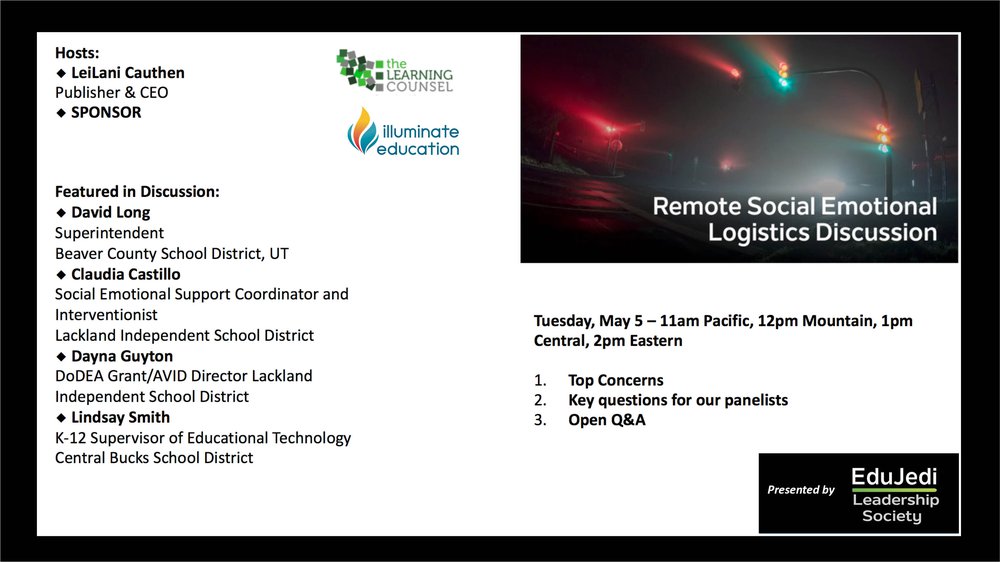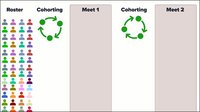Even before the COVID-19 pandemic, districts reported that social emotional issues were their number one pressure point. Now that districts are forced to deliver learning remotely, the need for social emotional learning is even higher. In this Learning Counsel Crossroads Virtual Discussion, some of the nation’s most successful districts share their SEL strategies.
LeiLani Cauthen, CEO and Publisher at The Learning Counsel has seen unusually high interest in the social emotional category. “We launched our 2020 national survey in January and we took responses all the way through mid-March when this whole quarantine thing started and everything changed in the world,” said Cauthen. “Since that point in time, answers have skyrocketed in the social emotional category. You can really see a difference before and after on this topic. Interest has peaked for all schools and districts. Concerns are for the types of people that you're servicing, the students, the parents and the teachers. I wouldn't leave out administrators either, but you have this identification of the issues which are different in different parts of the country. The screening, then how are you going to do the teaching and learning? What types of supports are you going to put in place, human and technology-wise? What new routines are you going to put in policy to make sure everyone is following so that you're actually moving the ball forward with your daily routines? Then your analytics obviously are super important, as is your internal and external advocacy.”
Dr. David Long, Superintendent, Beaver County School District said, “We've continued to employ mental health professionals throughout this. It became a moment of clarity for everybody in terms of wrestling with our digital life and our social isolation and all the things that we're dealing with. We started setting up standards immediately for what our expectations were. One standard was that the staff would have somebody that was a partner or mentor on the staff that was contacting them daily. We also have a standard that students had to be in contact daily. If we did not hear from students within three days, they went to our high risk category and if we weren't able to reach them, we either involved our school resource officers or our mental health counselors and other school counselors in going to homes and reaching out to those students and making sure that there's a wellness check done at that point. There is a real heightened awareness of people communicating on a regular basis.
“One of the big deals that happened with our teachers immediately going into this is they didn't know when to turn off or to take a walk or have a moment for themselves. I had teachers that were working 10, 12 hours a day on a consistent basis and thinking that they were only going to have to keep that up for two or three weeks. As we learned this was going to be something that was through the rest of the school year, it became critical to start having conversations with staff that were doing that and get them into a better routine and a better place as well.”
Claudia Castillo is the Social Emotional Support Coordinator and Interventionist for Lackland ISD. According to Castillo, “My approach during the pandemic has been one of a crisis counselor. I have focused on the immediate needs of our students to ensure that they're having their basic needs met before we can ask them to participate in virtual learning. Our district is very lucky that we have students who are dependents of military families who have not lost their jobs and are still receiving a steady income and have available resources. Our school district has four military and family life counselors.
This is a nonmedical free counseling program to any dependent of military families. The department of defense provides this to our military families so they can have mental health support. And then we also brought in my position to help with our counseling department.
“Our counselors and staff have been providing check-ins with students who have a 504 and IEP or who are identified as students that needed additional behavioral support. Our teachers also reach out to counselors whenever they check in with a student who is struggling. The counselors then reach out to the parents and ask what they can do to help. One of the first things that I started to teach our school was how we ask questions. Many times, people want to ask, why is this happening? Or why is this student acting the way that they are? But I stepped back and had them ask in a different way because many times people don't know why they do the things that they do.”
Dayna Guyton is the DODEA (Department of Defense Education Activity) Grant/AVID Director at Lackland ISD and works in lockstep with Claudia Castillo. When speaking of teachers, Guyton said, “You cannot pour from an empty cup, with regards to teachers going into this and really never ever turning themselves off from work, constantly being at work, constantly working on something, constantly being available to students, answering questions. We wanted to take care of that. We need to check in, not just to say what are we doing for the students? We have to the check in to say, how are you guys doing? We all left for spring break prepared to come to have a great break and then come back. But nobody expected to go on spring break and not come back at all.”
Lindsay Smith, K-12 Supervisor of Educational Technology, Central Bucks School District said, “What we tried to do was create an area in our district website that's outward facing, because we have lots of internal annex central resources. But how do we provide families the resources so that they aren't getting stressed out? Because now you have families at home or maybe mom and dad lost their job and they're trying to school children when they've never done that before, using technology that they've never had access to. So, we created another clickable resource for our community of caregivers that said, you know what, that's okay. Just get in, here's how we're going to do this.”
Watch the video
Districts are experiencing challenges from all angles – not the least of which is the social emotional well-being of their students, parents and staff. In this very special Crossroads Virtual Discussion, education leaders present some of the nation’s leading ideas. These ideas are free for the taking. You’ll want to watch the discussion and share these ideas in your own school or district.
About our sponsor
Illuminate Education partners with educators to reach new levels of student performance, empowering teachers with data to serve the whole child. Our solution brings together holistic data and collaborative instructional tools and puts them in the hands of educators. As a result, they can visualize each student's progress, determine the right instructional or intervention strategy, and take the best next action, moment-by-moment. They are committed to supporting you and your team through this unprecedented time. We will continually update our COVID-19 page to provide articles, webinars, and other resources as the situation evolves.











